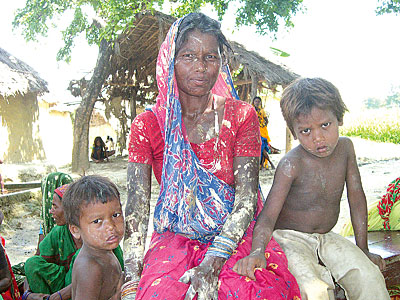 DAMBAR KRISHNA SHRESTHA |
In his Kantipur column of 20 December Hari Roka, a pro-Maoist commentator and lawmaker, argued that part of the reason why India opposed the Maoists promoting a federal state was that it feared "the establishment of a new social system based on the redistribution of property and freedom from untouchability would have consequences on its states close to Nepal".
The statement is, inter alia, representative of how the Maoists continue to use Dalits in their propaganda. They have always claimed that theirs is a movement of the oppressed masses, and indeed many Dalits have sacrificed their lives for the cause. However, Roka's claim about untouchability rings hollow because there is little evidence to show that the ex-rebels actually care about the deeply entrenched problems of low castes.
On the contrary, Dalits increasingly feel they have had the rug pulled out from under them, not least because of the Maoists' unilateral declaration of autonomous ethnic states. Firstly, Dalits are not going to have their own autonomous state; they will be a tiny minority in all states. More importantly, Dalits suffer indignities and injustices not only at the hands of Bahuns and Chhetris, but also from Rais, Limbus, Madhesis, Gurungs, Magars, Newars, and others.
A 2006 report in Nepali Times stated: "In the hotbed of Tarai ethnic politics, mainstream Madhesi rights activists, anti-hills-people vigilantes, Maoist splinter groups and Tharu groups are demanding everything from greater autonomy to secession. But Madhesi Dalits are nowhere in the equation" ('Sideswiped', #320). The parties' attitude to Dalits in the Tarai and the hills remains the same, despite the pressure of massive political changes.
Hugo Gorringe, a British anthropologist who studied Indian Dalits, observes: "untouchability, it is clear, is irreconcilable with nationhood, and undermines the democratic project". The Nepali Congress and UML, despite their democratic credentials, have always refrained from taking Dalit issues seriously; their own workers and supporters regularly practice untouchability. The former rebels' initial enthusiasm about doing away with caste-based subordination has also been ephemeral. For instance, the Maoist government didn't, despite the popular expectation, start anything concrete to help Dalits; neither did it attempt to include them in important positions. Although they have been insisting on federal states named after particular groups, they have not yet articulated their policies on how untouchability can be effectively tackled.
Whilst Dalits are still struggling to become bona fide citizens of Nepal, they will have to fight separately to become the citizens of autonomous states as well. Dr Bhimrao Ambedkar's prescription for the Dalit movement was: "educate, agitate, organise". The implementation of autonomous ethnic states is likely to hinder these strategies, not least because the Dalit movement will then be dispersed and consequently further weakened.
Some believe that untouchability cannot be tackled until caste is annihilated; others think it can be challenged by emphasising the socioeconomic relationship between castes on the basis of modern national laws over customary ones. We should attempt to integrate low castes with other castes or ethnic groups to pave the way for a more egalitarian society. Ethnic federalism will only institutionalise and solidify caste or ethnic boundaries, instead of undermining them.
The Maoists are likely to lose the support of many Dalits and others by pushing for their retrograde demand for ethnic federalism, even if it helps them in the short term. Like most Nepali citizens, Dalits want to live in peace with more dignity and better economic opportunities. This simple dream cannot be fulfilled if the powers that be don't give up their stance on ethnic federalism under the facade of revolutionary change.



